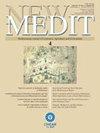猕猴桃农户农药使用知识、态度和行为评价
IF 1.2
4区 经济学
Q3 AGRICULTURAL ECONOMICS & POLICY
引用次数: 0
摘要
本研究旨在评估生产者在农药使用方面的知识、态度和行为。这项研究是在本文章由计算机程序翻译,如有差异,请以英文原文为准。
Evaluation of Knowledge, Attitude and Behavior in Agricultural Pesticide Use of Kiwi Farmers
In this study, it was aimed to evaluate the knowledge, attitudes, and behaviors of producers in pesticides use. The study was conducted in 7 provinces of Türkiye (Yalova, Bursa, Ordu, Rize, Mersin, Samsun and Sakarya) where are significant potential in Türkiye’s kiwi production and these provinces constitute approximately 90% of Türkiye’s total kiwi production in terms of production. According to the findings of study, the average age of the producers was 50.2 and the average of their agricultural activity period was 24.8. The average land size of the producers is 32.4 decares, the average fruit land is 22.9 decares and the average kiwi cultivation area is 14.7 decares. While 60% of the producers stated that they obtained pesticides and fertilizers from agrochemical dealers, 33.7% of them applied spraying when they first observed the disease, 40.1% of the producers stated that they determined the time and pesticide amounts to be used according to their own experiences. It has been determined that approximately 92% of the producers think that the agricultural pesticides used have negative effects on human health. To mitigate the negative effects of agrochemical overuse on both human health and the environment, policy makers and agricultural institutions should prioritize educational campaigns aimed at raising awareness among farmers.
求助全文
通过发布文献求助,成功后即可免费获取论文全文。
去求助
来源期刊

New Medit
AGRICULTURE, MULTIDISCIPLINARY-
CiteScore
2.00
自引率
30.00%
发文量
31
审稿时长
>12 weeks
期刊介绍:
New Medit is an applied economics journal, with a multidisciplinary approach, aimed at providing insights into the economic and the social transformations of agro-food sector, rural societies as well as local development and bioeconomy in the Mediterranean Basin.
Manuscripts submitted to NEW MEDIT generally should deal with wide-ranging topics that can be extended to other countries where organisational, production and market conditions and the related development policies may emerge at the corporate or regional level.
 求助内容:
求助内容: 应助结果提醒方式:
应助结果提醒方式:


